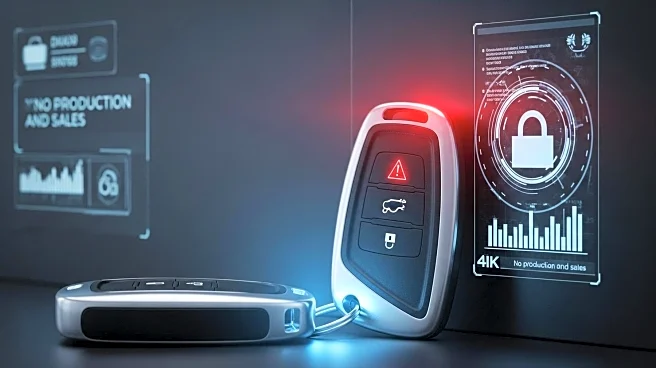What's Happening?
Jaguar Land Rover, a British luxury car manufacturer owned by Tata Motors, has experienced a significant cybersecurity incident that has severely disrupted its retail and production activities. The company announced that it is working to restart operations in a controlled manner. Despite the shutdown of its systems to mitigate the impact, Jaguar Land Rover has not found any evidence of customer data theft at this stage. This incident follows a report in July indicating delays in the launch of its electric Range Rover and Jaguar models due to additional testing and demand concerns. The company is among several British firms recently affected by a surge in cyber and ransomware attacks globally.
Why It's Important?
The cybersecurity incident at Jaguar Land Rover highlights the growing threat of cyber attacks on major corporations, which can lead to significant operational disruptions and potential financial losses. As companies increasingly rely on digital systems for production and sales, the risk of cyber threats becomes more pronounced, necessitating robust cybersecurity measures. This incident underscores the importance of cybersecurity in protecting sensitive data and maintaining business continuity. The automotive industry, particularly luxury brands like Jaguar Land Rover, may face increased scrutiny and pressure to enhance their cybersecurity protocols to prevent future incidents.
What's Next?
Jaguar Land Rover is currently focused on restarting its operations in a controlled manner following the cybersecurity incident. The company may need to invest in stronger cybersecurity measures to prevent future disruptions and protect customer data. Additionally, the incident could prompt other automotive manufacturers to reassess their cybersecurity strategies and implement more rigorous protections against cyber threats. Stakeholders, including customers and investors, will likely monitor the company's response and recovery efforts closely.
Beyond the Headlines
The incident at Jaguar Land Rover may have broader implications for the automotive industry, highlighting the vulnerability of digital systems to cyber attacks. As automakers increasingly integrate technology into their vehicles and operations, the risk of cyber threats grows, potentially affecting consumer trust and industry standards. This event could lead to increased collaboration between automotive companies and cybersecurity firms to develop more effective defenses against cyber threats.










